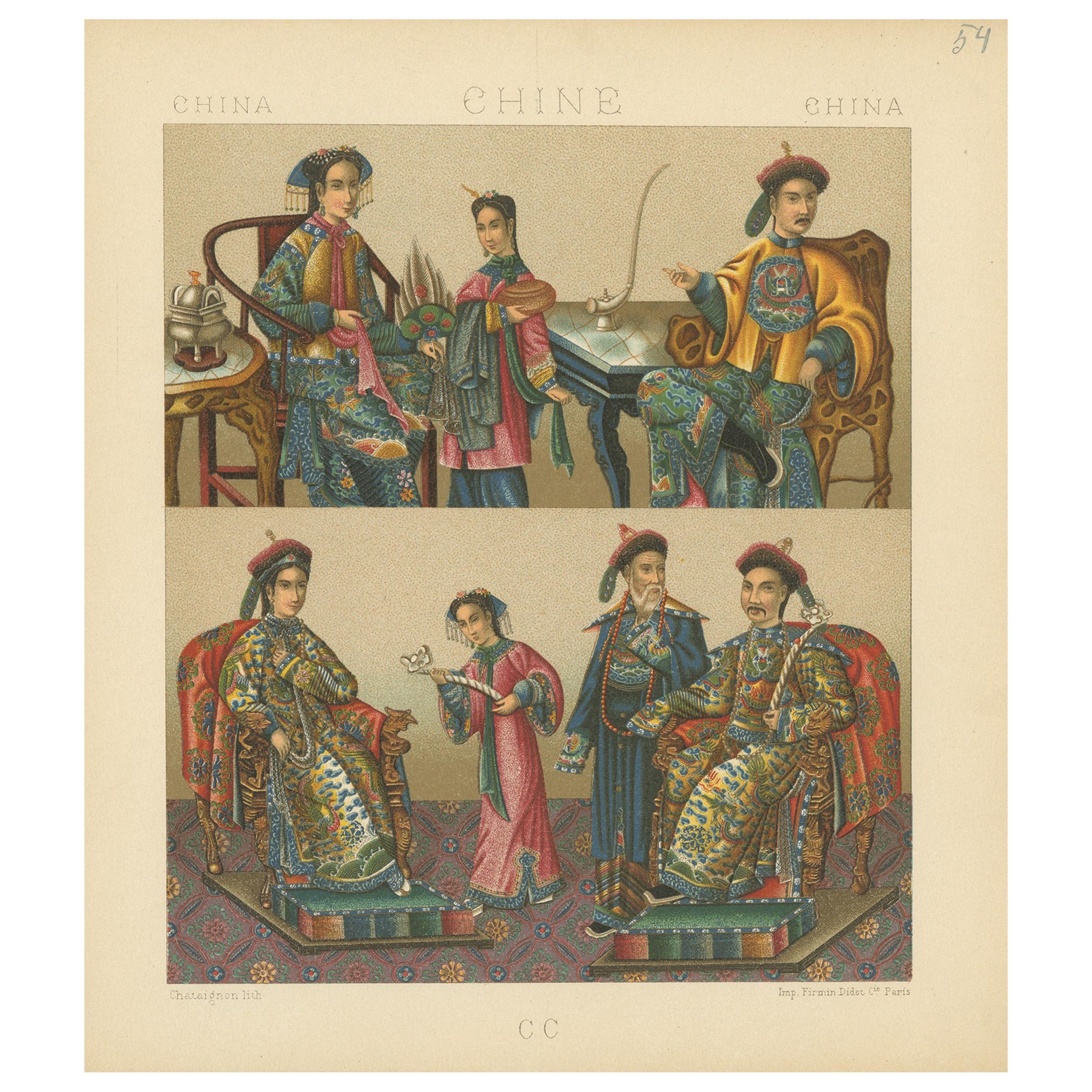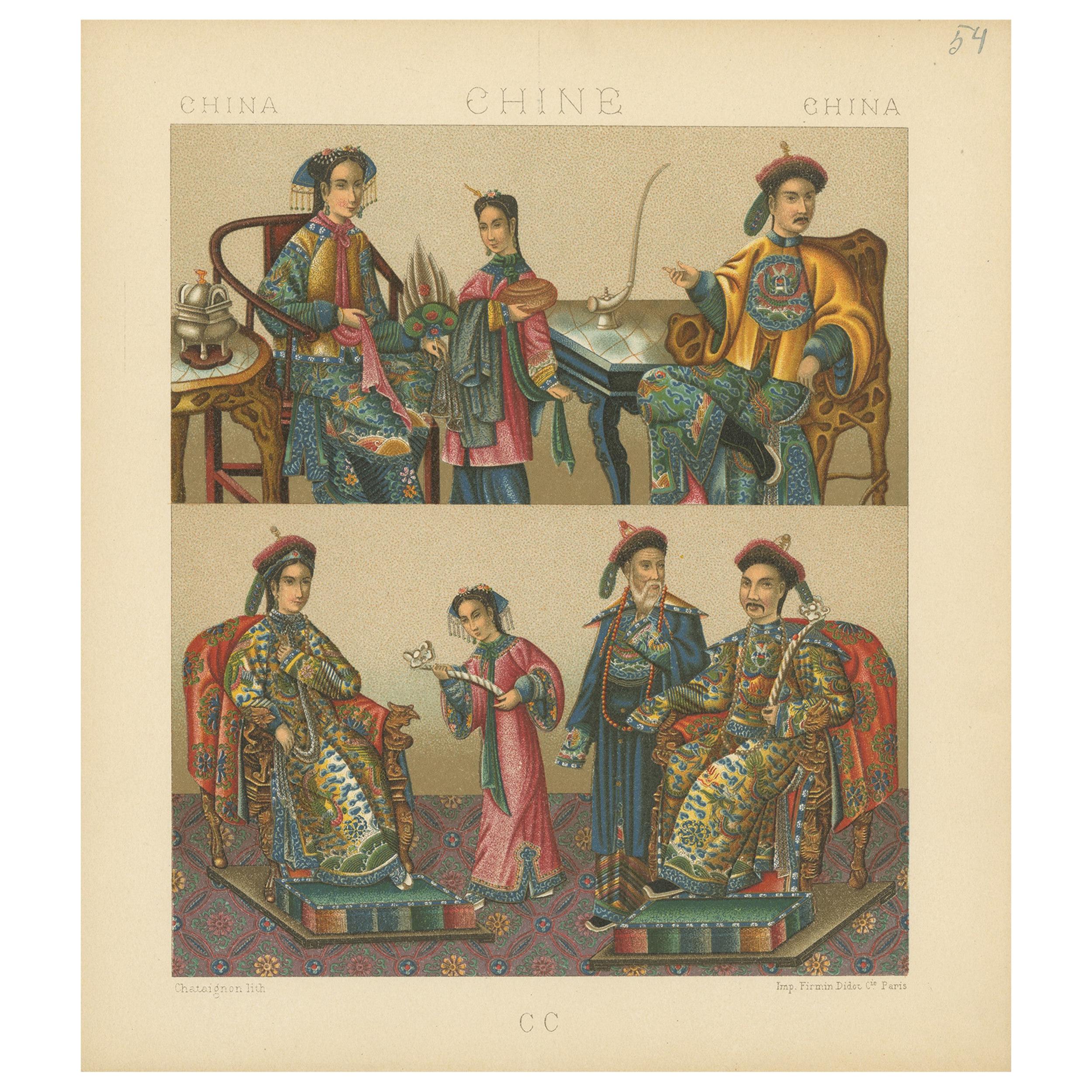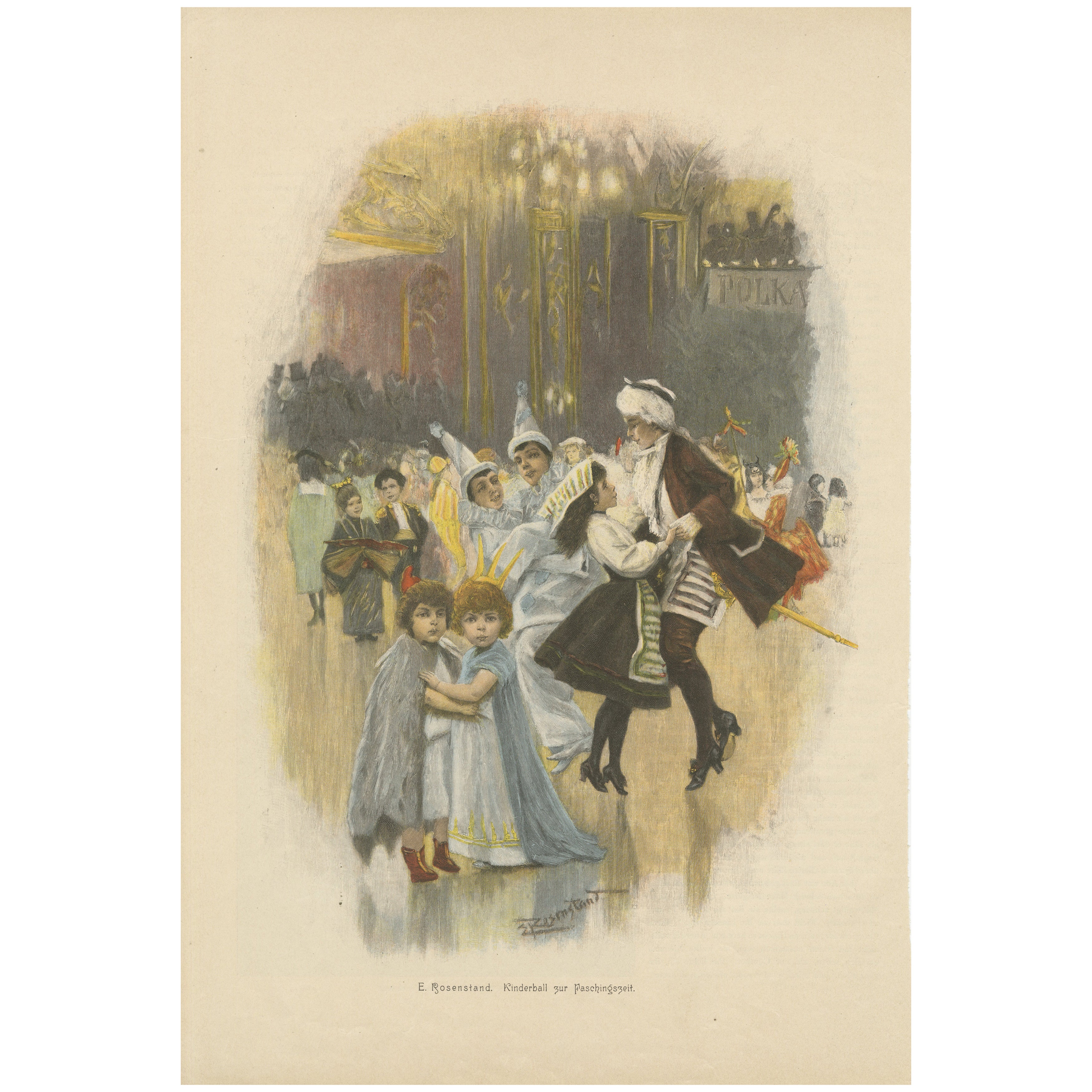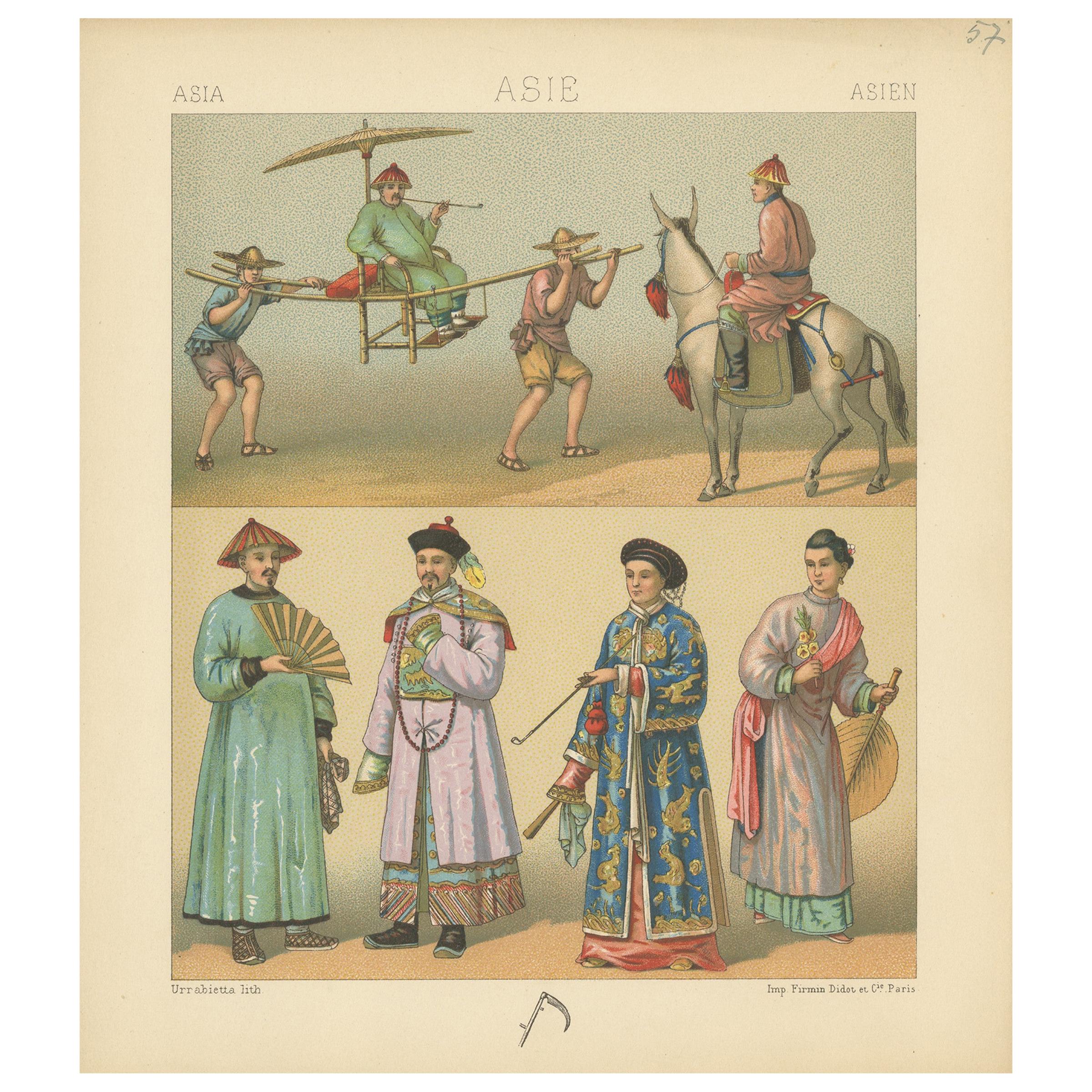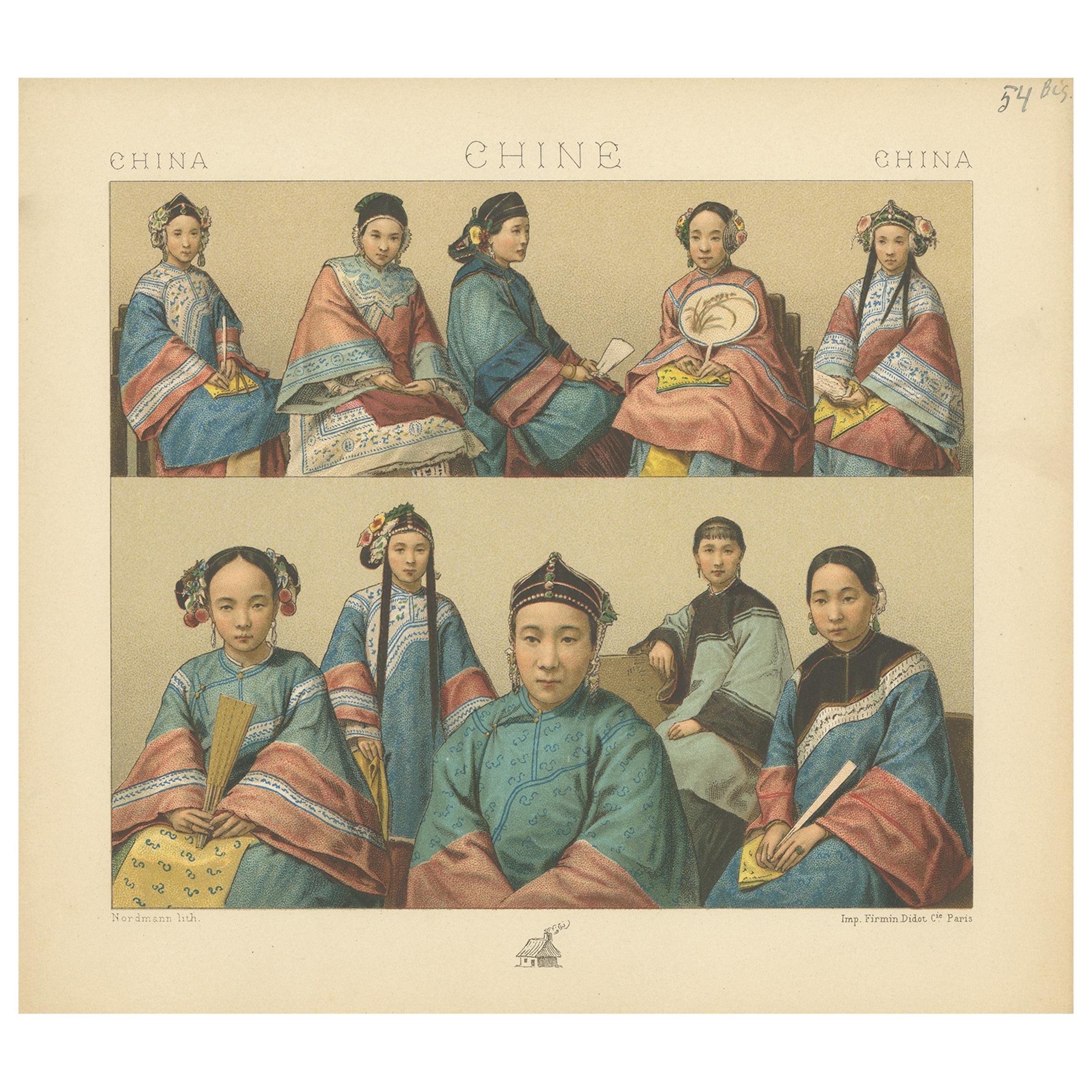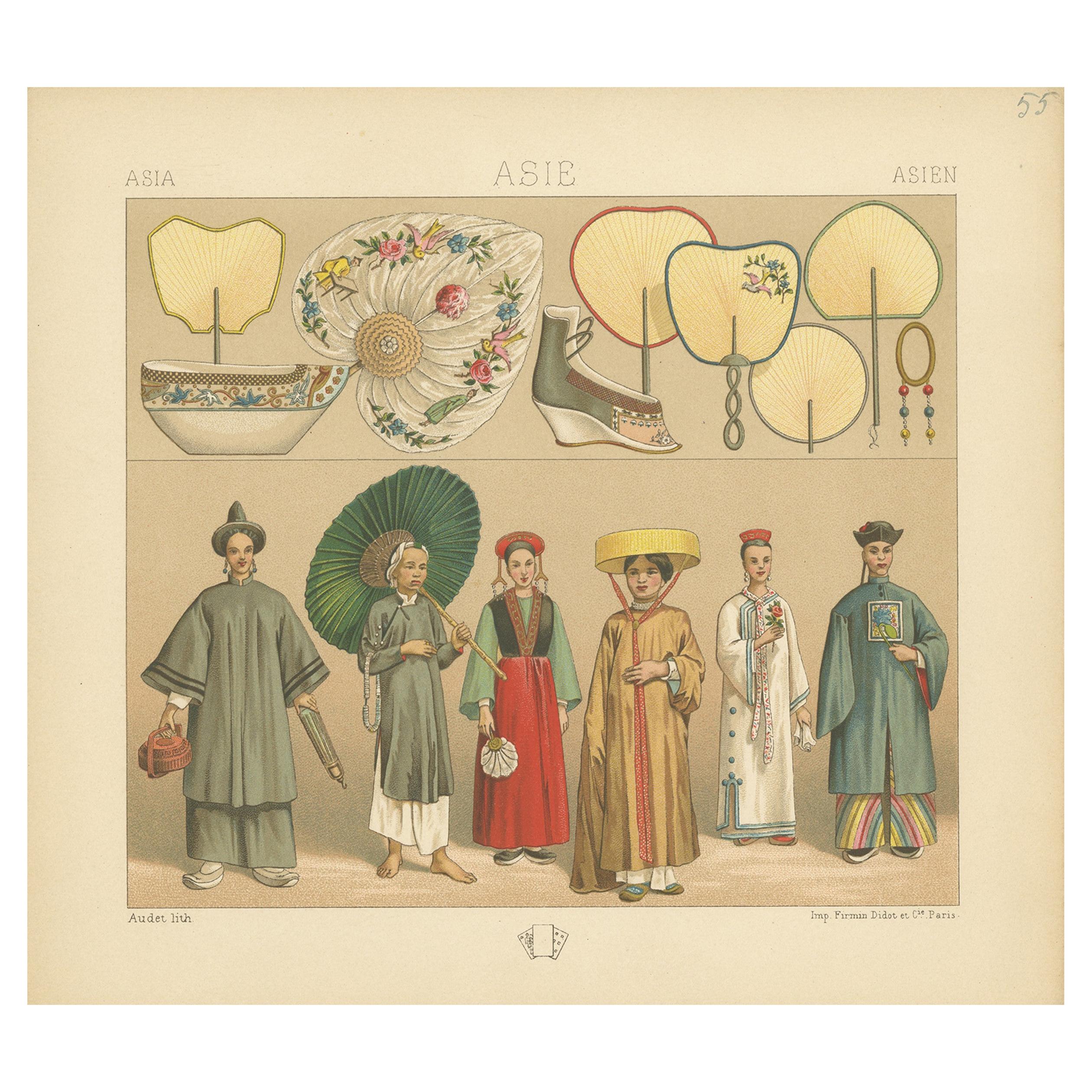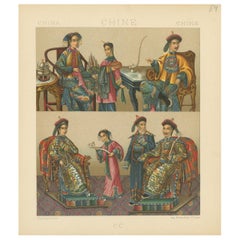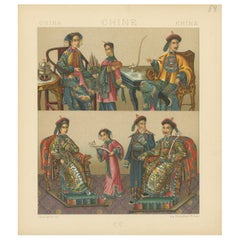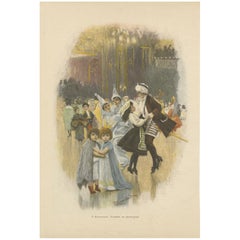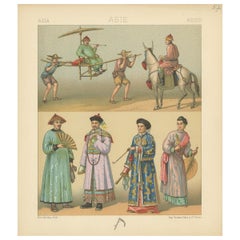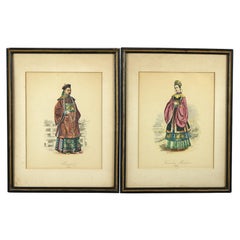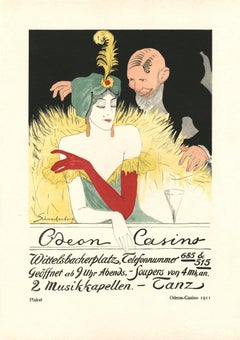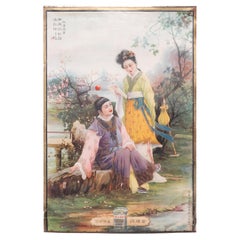Items Similar to Oriental Carnival Costume Scene – “Faschingsfreuden” by Edward Cucuel, c. 1900
Want more images or videos?
Request additional images or videos from the seller
1 of 10
Oriental Carnival Costume Scene – “Faschingsfreuden” by Edward Cucuel, c. 1900
$409.14
£302.91
€340
CA$566.48
A$618.46
CHF 324.23
MX$7,511.44
NOK 4,049.15
SEK 3,823.48
DKK 2,588.49
About the Item
Carnival Costume Scene – “Faschingsfreuden” by Edward Cucuel, c. 1900
This lively and colorful chromolithograph titled Faschingsfreuden (Carnival Pleasures) captures a humorous and theatrical masquerade scene by American-born artist Edward Cucuel (1875–1954). Signed in the lower right corner “Cucuel,” the print likely dates to the late 19th or early 20th century, when the artist was working in Germany and Austria.
The image depicts a man dressed in an exaggerated and stereotyped “Oriental” costume, complete with a red folding fan and elaborately embroidered robe in the style of Chinese court dress. He is flanked by two elegantly dressed European women in fashionable fin-de-siècle evening attire—one in a yellow gown with black sash and gloves, the other in a green dress and red cloak trimmed with white fur. The man’s theatrical pose, the women’s amused expressions, and the title all suggest the scene takes place during Fasching, the Germanic carnival season known for balls, parties, and masked festivities.
The artist Edward Cucuel was known for his genre scenes and portraits, often with an air of social satire or playful eroticism. Born in San Francisco, Cucuel studied in Paris and Munich and worked extensively in Germany, where he gained popularity for his depictions of stylish women and upper-class leisure. This print is a fine example of his early work in chromolithography, before he became more widely known for Impressionist paintings.
This print also reflects the turn-of-the-century fascination with Orientalism and costuming, albeit with elements that would now be considered culturally insensitive. It offers insight into the theatrical and carefree spirit of pre-World War I European society, where exoticism and masquerade were fashionable and widely popular.
Condition: Very good condition with vibrant original colors. Light horizontal fold visible across the center. Minor edge wear and faint toning in the margins. Paper remains strong and clean overall.
Framing tips: A gold or ebonized frame with a wide ivory mat will bring out the refined tones and festive character of this print. Ideal for collectors of Art Nouveau or theatrical illustrations.
Technique: Chromolithograph
Maker: Edward Cucuel, Germany, c. 1900
- Dimensions:Height: 22.45 in (57 cm)Width: 15.95 in (40.5 cm)Depth: 0.01 in (0.2 mm)
- Materials and Techniques:
- Place of Origin:
- Period:1900-1909
- Date of Manufacture:circa 1900
- Condition:Condition: Very good condition with vibrant original colors. Light horizontal fold visible across the center. Minor edge wear and faint toning in the margins. Paper remains strong and clean overall.
- Seller Location:Langweer, NL
- Reference Number:Seller: BG-12431-221stDibs: LU3054346172512
About the Seller
5.0
Recognized Seller
These prestigious sellers are industry leaders and represent the highest echelon for item quality and design.
Platinum Seller
Premium sellers with a 4.7+ rating and 24-hour response times
Established in 2009
1stDibs seller since 2017
2,641 sales on 1stDibs
Typical response time: <1 hour
- ShippingRetrieving quote...Shipping from: Langweer, Netherlands
- Return Policy
Authenticity Guarantee
In the unlikely event there’s an issue with an item’s authenticity, contact us within 1 year for a full refund. DetailsMoney-Back Guarantee
If your item is not as described, is damaged in transit, or does not arrive, contact us within 7 days for a full refund. Details24-Hour Cancellation
You have a 24-hour grace period in which to reconsider your purchase, with no questions asked.Vetted Professional Sellers
Our world-class sellers must adhere to strict standards for service and quality, maintaining the integrity of our listings.Price-Match Guarantee
If you find that a seller listed the same item for a lower price elsewhere, we’ll match it.Trusted Global Delivery
Our best-in-class carrier network provides specialized shipping options worldwide, including custom delivery.More From This Seller
View AllPl. 54 Antique Print of Chinese Costumes by Racinet, 'circa 1880'
Located in Langweer, NL
Antique print titled 'China - Chine - China'. Chromolithograph of Chinese costumes. This print originates from 'Le Costume Historique' by M.A. Racinet....
Category
Antique Late 19th Century Prints
Materials
Paper
$96 Sale Price
20% Off
Pl. 54 Antique Print of Chinese Costumes by Racinet, 'circa 1880'
Located in Langweer, NL
Antique print titled 'China - Chine - China'. Chromolithograph of Chinese costumes. This print originates from 'Le Costume Historique' by M.A. Racinet....
Category
Antique Late 19th Century Prints
Materials
Paper
$96 Sale Price
20% Off
Festive Children's Carnival Ball – “Kinderball zur Faschingszeit”, ca.1895
Located in Langweer, NL
Festive Children's Carnival Ball – “Kinderball zur Faschingszeit” by E. Rosenstand, c. 1895
This delightful color lithograph, titled “Kinderball zur Faschingszeit” (Children’s Ball ...
Category
Antique 1890s Prints
Materials
Paper
Pl. 57 Antique Print of Asian Costumes by Racinet, 'circa 1880'
Located in Langweer, NL
Antique print titled 'Asia - Asie - Asien'. Chromolithograph of Asian Costumes. This print originates from 'Le Costume Historique' by M.A. Racinet. Publ...
Category
Antique Late 19th Century Prints
Materials
Paper
$96 Sale Price
20% Off
Pl. 54B Antique Print of Chinese Costumes by Racinet, 'circa 1880'
Located in Langweer, NL
Antique print titled 'China - Chine - China'. Chromolithograph of Chinese costumes. This print originates from 'Le Costume Historique' by M.A. Racinet....
Category
Antique Late 19th Century Prints
Materials
Paper
$96 Sale Price
20% Off
Pl. 55 Antique Print of Asian Costumes by Racinet, 'circa 1880'
Located in Langweer, NL
Antique print titled 'Asia - Asie - Asien'. Chromolithograph of Asian costumes. This print originates from 'Le Costume Historique' by M.A. Racinet. Publ...
Category
Antique Late 19th Century Prints
Materials
Paper
$96 Sale Price
20% Off
You May Also Like
Antique Hand Colored Oriental Mandarin Prints, Man & Woman of Royalty, c1900
Located in Big Flats, NY
An antique set of hand colored portraits depict a man and woman in royalty garb, framed, signed as photographed, c1900.
Measures- 14'' H x 10.75...
Category
Early 20th Century Asian Prints
Materials
Paper
$440 Sale Price / set
20% Off
Carnival : Happy Demonstration - Original lithograph - 1898
Located in Paris, IDF
Henri Patrice DILLON
Carnival : Happy Demonstration, 1898
Original lithograph (Champenois workshop)
Printed signature in the plate
On vellum, 40 x 31 cm (c. 16 x 12 in)
INFORMATION...
Category
1890s Art Nouveau Figurative Prints
Materials
Lithograph
Kostume, Plakate, und Dekorationen, "Odeon-Casino 1911"
By Walter Schnackenberg
Located in Chicago, IL
Walter Schnackenberg’s style changed several times during his long and successful career. Having studied in Munich, the artist traveled often to Paris where he fell under the spell of the Henri de Toulouse-Lautrec’s colorful and sensuous posters depicting theatrical and decadent subjects. Schnackenberg became a regular contributor of similar compositions to the German magazines Jugend and Simplicissimus before devoting himself to the design of stage scenery and costumes. In the artist’s theatrical work, his mastery of form, ornamentation, and Orientalism became increasingly evident. He excelled at combining fluid Art Nouveau outlines, with spiky Expressionist passages, and the postures and patterns of the mysterious East.
In his later years, Schnackenberg explored the unconscious, using surreal subject matter and paler colors that plainly portrayed dreams and visions, some imbued with political connotations. His drawings, illustrations, folio prints, and posters are highly sought today for their exceedingly imaginative qualities, enchanting subject matter, and arresting use of color.
SCHNACKENBERG: KOSTUME, PLAKATE UND DEKORATIONEN, a cardboard bound art book consisting of 43 prints of work by Walter Schnackenberg, 30 of which are color lithographs that are signed and some are titled and dated in the plate, as well as black and white prints and photographs with accompanying text by Oskar Bie; lithographs printed at Kunstanstalt Oskar Consee in Munich, other images printed by Gesellschaft Pick & Co. in Munich, the text and cover with color images by Schnackenberg front and verso printed by R. Oldenbourg in Munich; published by Musarion Verlag, Munich, 1920.
The majority of Walter Schnackenberg’s artistic output was destroyed by bomb attacks in Munich in 1944. The highly publicized 2013 auction in New York of the recovered pre-war poster collection once belonging to German poster aficionado, Hans Sachs has reintroduced the world to Walter Schnackenberg’s graphic genius and priceless ephemeral art from a lost era. Besides the museum world, designer Karl Lagerfeld is one of the most prodigious collectors of Schnackenberg. Flipping through the pages of Kostume, Plakate und Dekorationen, it becomes quite clear that Schnackenberg’s collection is ground zero at the crossroads of early modern fashion where the cult of celebrity meets up with dance, music, theater and cabaret, film and the graphic medium. Berlin and Munich under Germany’s Weimar Republic in the first quarter of the 20th century produced just the atmosphere to feed this burgeoning industry. Rising inflation sparked a recklessness to live large for the moment and heightened a desire for escapism. An influx of Indian and East Asian dancers and musicians added to the artsy bohemian cultural mix. A new decadence and tolerance resulted. Film boldly featured provocative subject matter. Cabarets became popular venues giving rise to the demi-monde in which people from all social stations mixed more freely in a thriving underground economy and culture where there was a blurring of boundaries and of social codes. Noted art historian and cultural doyen, Oskar Bie astutely observes in his introduction to Schnackenberg’s publication that what unites the images is fantasy and advertisement. Schnackenberg uses the eye as an instrument to brilliantly construct and convey this double message. His personages never directly confront the viewer. Their eyes gaze off in the distance like those of the screenplayer and film star Hedamaria Scholz in Schnackenberg’s “Die Rodelhexe” movie poster. Their eyes follow the path of a dance composition or become a transfixed and ogling male gaze such as the iconic 1911 Odeon Casino...
Category
1910s Expressionist Figurative Prints
Materials
Lithograph
Vintage Chinese Deco Gold Bar Cigarettes Advertisement Poster, c. 1930
Located in Chicago, IL
This 1930s advertising poster for the Gold Bar Cigarettes company draws from a well known Chinese opera scene. It melds the meticulous detail of trad...
Category
Early 20th Century Chinese Art Deco Prints
Materials
Paper
Theatrical Costume - Original Lithograph - 1880
Located in Roma, IT
Theatrical Costume is a splendid hand-colored lithograph engraved in 1880 ca. by Anonymous Artist of XIX Century.
The state of preservation of the ...
Category
1880s Figurative Prints
Materials
Lithograph
Vintage Chinese Cigarette Advertisement Poster, c. 1930
Located in Chicago, IL
This poster from the 1930s draws from a well known Chinese opera scene. It melds the meticulous detail of traditional Chinese painting with the craft of color lithography. These advertisements, influenced by the Art Deco movement in the west, recall the economic boom of early 20th century Shanghai, an international center of business and trade. Layered with imagery of traditional Chinese life, the poster is nonetheless an advertisement for the modern cigarette industry, with several tobacco brands displayed in the top left corner, including Lan Ting, Hong Chun, and Jade Rabbit...
Category
Early 20th Century Art Deco Figurative Drawings and Watercolors
Materials
Paper, Ink
More Ways To Browse
Gold And Black Dress Embroidered
Red Green Dress
Japanese Root Wood
Japanese Scroll Flower
Japanese Shell Art
Japanese Sword Furniture
Jean Roger Paris
Jiaqing Porcelain
Karl Muller
Kodak Vintage
Lane Cedar Chest
Large Block Prints
Large Ceramic Cat
Large Chinese Foo Dogs
Large Giraffe Sculpture
Large Menorah
Lattice Dining Table
Le Nid
